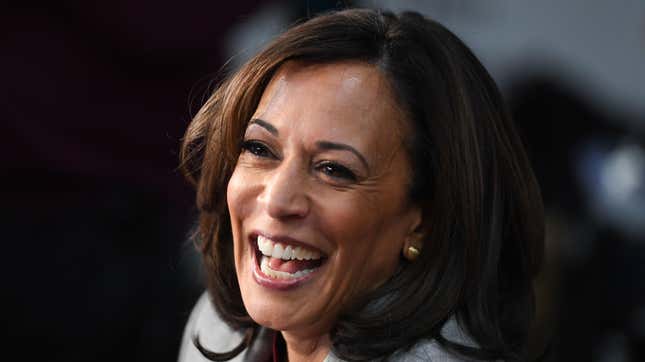The Ambivalence, Pride, and Mixed Feelings of Kamala Harris's Candidacy
Politics

Soon after Sen. Kamala Harris was selected to be Joe Biden’s 2020 running mate, I texted some old friends from college. Like Harris, I attended Howard University, a historically black college in Washington, D.C. that boasts an alumni list filled with notable Black politicians, artists, and entertainers; Toni Morrison and Thurgood Marshall, Debbie Allen and Taraji P. Henson. Howard graduates are proud, and the outside successes of a fellow Bison are treated as a badge of honor.
But the conversations between my friends and me didn’t comprise of breathless wonderment that the potential next Vice President or future President of the United States could be a Howard graduate. We understood the historic significance of Harris’s nomination, but we also understood the controversy surrounding Harris’s prosecutorial record and our collective naivete during the Obama years, enough to put a damper on the excitement that buzzed around the Harris selection.
I considered the months ahead, the casual misogyny and racism to come, the draining discourse about Harris’s immigrant background, the tiresome “yas queen”-ing from those who treat politics like a fandom. Naturally, the aforementioned all happened within the first 24 hours of the announcement, and somewhere in between a right-winger claiming Harris isn’t Black and a pro-Kamala Instagram post comparing Harris to Black activists of yore stood me, wondering if everyone has lost their damn minds or if my lack of enthusiasm was the only thing strange around here.
Harris long felt like the obvious choice: Tough, experienced, and genial. Anyone who witnessed her debate performance during the Democratic primary or her ruthless interrogation of Brett Kavanaugh or Jeff Sessions during Senate hearings knows that Harris packs some punch, exactly what Biden—an affable if bland figure—needed. Her controversial record as San Francisco’s District Attorney and California Attorney General—a melange of modest reforms and carceral status quo—might have put her out of the running for many on the left, but this was likely of little consequence to Biden, a man with his own messy history regarding criminal justice. It is also likely of little consequence to white suburbanites who probably won’t care about someone on Twitter calling Kamala Harris a cop.
But the road to Harris’s selection was ghoulish. Not only was the selection process was aided by former Senator Chris Dodd, a virulent sexist, but because it was clear that Biden’s pick must appropriately appeal to one of America’s most fickle demographics: Suburban white women. And the minute Biden’s veep search shifted from selecting a woman to selecting a woman of color—specifically, a black woman—my dread set in. It was as if the campaign, pundits, and keyboard political analysts scrambled to make a detailed spreadsheet of every black woman in American politics and subsequently pick her apart. Take the typically invasive vetting process and add a heaping of misogynoir and voila: The search for the safest black woman in politics was on.
A few Jezebel readers were rubbed the wrong way by our tongue-in-cheek comparison of Harris’s selection to receiving a rose on The Bachelor, but given the way many media outlets, spectators, and even Biden himself treated the oddly long selection process—breathless, like a nailbiting season finale—it felt apt. The Bachelor: Ebony Edition. Was the early dismissal of Stacey Abrams—a woman who was derided for daring to show eagerness at the prospect of being vetted for VP—due to her lack of experience holding statewide office, or were colorism and fatphobia part of the equation as well? Was Karen Bass rejected due to ideology, or age?
-

-

-

-

-

-

-

-

-

-

-

-

-

-

-

-

-

-

-

-

-

-

-

-

-

-

-

-

-

-

-

-

-

-

-

-

-

-

-

-








































